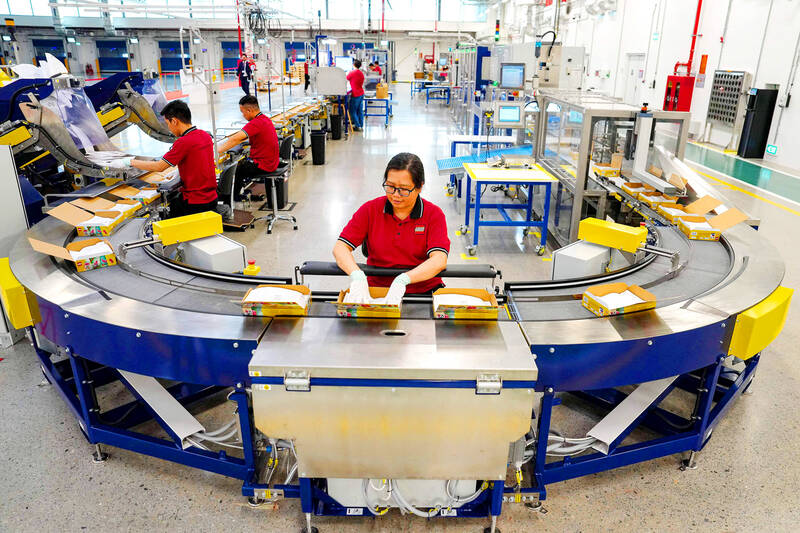In hope of avoiding punishing US tariffs, Vietnam is prepared to crack down on Chinese goods being shipped to the US via its territory, and is to tighten controls on sensitive exports to China, said a person familiar with the matter and a government document seen by Reuters showed.
The offer came as senior US officials, including US President Donald Trump’s trade advisor Peter Navarro, raised concerns about Chinese goods being sent to the US with “Made in Vietnam” labels that draw lower duties. Vietnam has for weeks been offering sweeteners that it hoped would persuade Trump’s administration to take a benign view of its huge trade surplus with the US.
Instead, it was hit with a 46 percent tariff as part of Trump’s “liberation day” salvo.

Photo: AFP
While the tariff has been suspended for 90 days, the two countries agreed to start talks after Vietnamese Deputy Prime Minister Ho Duc Phoc met with US Secretary of the Treasury Scott Bessent on Wednesday.
Export-reliant Vietnam is hoping to get the duties reduced to a range of 22 percent to 28 percent, if not lower, three people with knowledge of the matter said.
One of them said that US officials during a bilateral meeting last month had signaled that range was likely.
In announcing the start of trade talks with the US yesterday, Vietnam’s government said on its official portal it would crack down on “trade fraud.” It did not provide specifics.
Since Trump’s first term, many multinational firms have implemented a “China plus one” policy of setting up factories in Vietnam to reduce exposure to Beijing.
The Southeast Asian nation is in a tight spot as it tries to preserve trade with the US, which is its largest export market and a security partner. At the same time, Hanoi does not want to antagonize China, which is a top source of investment as well as a neighbor with which it has clashed over boundaries in the South China Sea.
Vietnam’s Government Office, a body that coordinates between its ministries, held an emergency meeting with government trade experts on Thursday last week, hours after Trump announced the tariffs.
The aim was to address Washington’s concerns over alleged intellectual property theft and transhipment abuses, a person briefed on the meeting said.
At the meeting, the Vietnamese Ministry of Industry and Trade and customs officials were told to tighten controls and were given two weeks to devise a plan to clamp down on illicit transhipment.
The deadline could be extended until late this month, the person said, adding that Hanoi wanted to be careful not to provoke China.
Illicit transhipment refers to one country sending goods to a nation facing lower tariffs from a third country, to which the product is re-exported without having value added to it.
Many of the goods exported by Vietnam to the West have Chinese-made inputs, and Chinese companies have also established factories in the country to serve US customers.

Real estate agent and property developer JSL Construction & Development Co (愛山林) led the average compensation rankings among companies listed on the Taiwan Stock Exchange (TWSE) last year, while contract chipmaker Taiwan Semiconductor Manufacturing Co (TSMC, 台積電) finished 14th. JSL Construction paid its employees total average compensation of NT$4.78 million (US$159,701), down 13.5 percent from a year earlier, but still ahead of the most profitable listed tech giants, including TSMC, TWSE data showed. Last year, the average compensation (which includes salary, overtime, bonuses and allowances) paid by TSMC rose 21.6 percent to reach about NT$3.33 million, lifting its ranking by 10 notches

SEASONAL WEAKNESS: The combined revenue of the top 10 foundries fell 5.4%, but rush orders and China’s subsidies partially offset slowing demand Taiwan Semiconductor Manufacturing Co (TSMC, 台積電) further solidified its dominance in the global wafer foundry business in the first quarter of this year, remaining far ahead of its closest rival, Samsung Electronics Co, TrendForce Corp (集邦科技) said yesterday. TSMC posted US$25.52 billion in sales in the January-to-March period, down 5 percent from the previous quarter, but its market share rose from 67.1 percent the previous quarter to 67.6 percent, TrendForce said in a report. While smartphone-related wafer shipments declined in the first quarter due to seasonal factors, solid demand for artificial intelligence (AI) and high-performance computing (HPC) devices and urgent TV-related orders

Prices of gasoline and diesel products at domestic fuel stations are this week to rise NT$0.2 and NT$0.3 per liter respectively, after international crude oil prices increased last week, CPC Corp, Taiwan (台灣中油) and Formosa Petrochemical Corp (台塑石化) said yesterday. International crude oil prices last week snapped a two-week losing streak as the geopolitical situation between Russia and Ukraine turned increasingly tense, CPC said in a statement. News that some oil production facilities in Alberta, Canada, were shut down due to wildfires and that US-Iran nuclear talks made no progress also helped push oil prices to a significant weekly gain, Formosa said

MINERAL DIPLOMACY: The Chinese commerce ministry said it approved applications for the export of rare earths in a move that could help ease US-China trade tensions Chinese Vice Premier He Lifeng (何立峰) is today to meet a US delegation for talks in the UK, Beijing announced on Saturday amid a fragile truce in the trade dispute between the two powers. He is to visit the UK from yesterday to Friday at the invitation of the British government, the Chinese Ministry of Foreign Affairs said in a statement. He and US representatives are to cochair the first meeting of the US-China economic and trade consultation mechanism, it said. US President Donald Trump on Friday announced that a new round of trade talks with China would start in London beginning today,